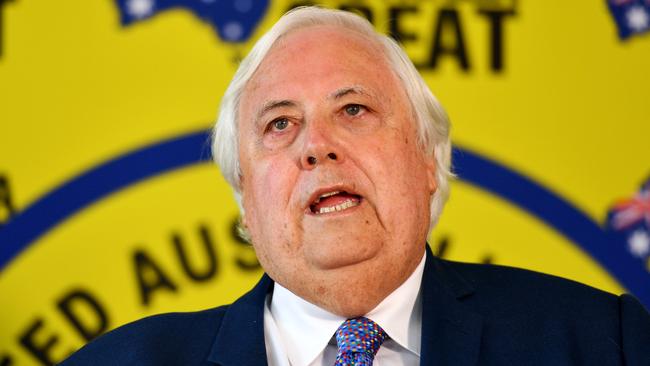Clive Palmer’s barrister tells High Court WA’s hard border was necessary at first but became unconstitutional
Clive Palmer’s problem with WA wasn’t that it closed its border, but that it didn’t open it when cases fell, court told.

Western Australia’s hard border closure only became unconstitutional “when circumstances changed” in the midst of the COVID-19 pandemic and it was not removed, Clive Palmer’s barrister told the High Court as he attempts to set a historic precedent to guarantee free interstate travel.
A decision may be handed down within a fortnight, even as border closures and reopenings around the country continue to change.
Peter Dunning QC, representing Mr Palmer, said in his closing statement that it could be assumed closing WA’s border was “reasonably necessary” when the pandemic first hit but the “real complaint” was that it was not later revoked, such as when community transmission all but evaporated before the second wave in Victoria.
READ MORE: State’s hard border necessary, court told | Border reopening could spell trouble for Palmer |
The states and territories defended WA’s border, prompting justice Stephen Gageler to question how the court should interpret the significantly different restrictions imposed by each government.
“The ACT’s restrictions overall are less restrictive than Western Australia’s, aren’t they?” Justice Stephen Gageler said. “You’re addressing the same pandemic … What do we make of that?”
ACT solicitor-general Peter Garrisson said each jurisdiction was different – in terms of its size, population, coronavirus testing and geography – and so the restrictions introduced and the demands of each state varied.
The territory’s border was porous, for example, with up to 80 points of entry. While a border did not make sense in the ACT, it was effective in WA because it was isolated.
Mr Dunning said the ACT solicitor-general’s evidence pointed to why the territory might have greater, not lesser, restrictions than WA.
“Western Australia is largely isolated by a desert, it has small border communities,” Mr Dunning said.
“The ACT was the most prone (to being exposed to COVID-19), it was completely surrounded by another state. It had many points of arrival and exit whereas Western Australia was much more limited because of the practicalities of getting there.”
WA solicitor-general Joshua Thomson SC said the border was rational, necessary, proportionate and there was no other reasonable alternative.
He said the court should act on the basis there was an ongoing state of emergency in WA because of the coronavirus and the “closing the border” direction that Mr Palmer argued was unconstitutional under section 92 simply prevented the potential adverse effects of the pandemic.
Section 92 of the constitution states that movement and travel between Australian states “shall be absolutely free” but exceptions have been made, including to deal with a public health emergency.
Mr Palmer did not appear at court, despite claims he was in Canberra.
The court reserved its decision.



